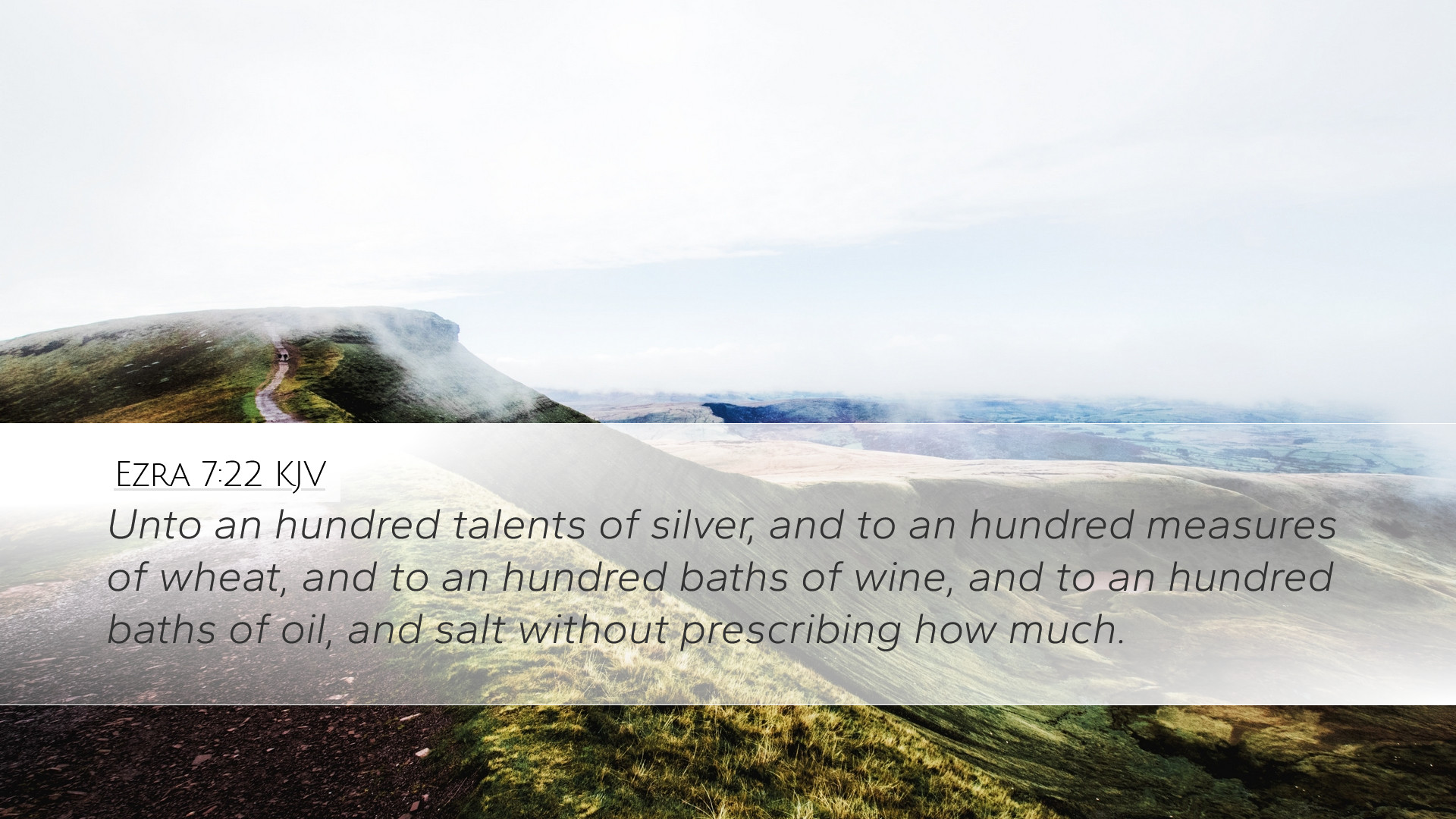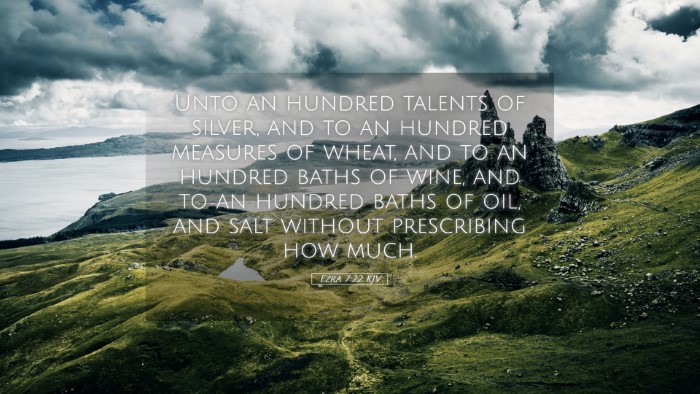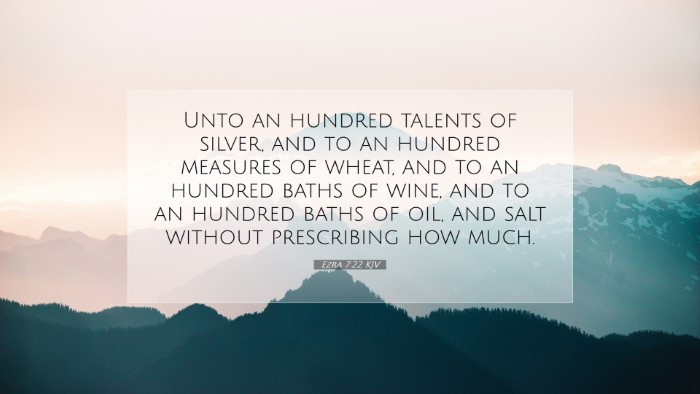Old Testament
Genesis Exodus Leviticus Numbers Deuteronomy Joshua Judges Ruth 1 Samuel 2 Samuel 1 Kings 2 Kings 1 Chronicles 2 Chronicles Ezra Nehemiah Esther Job Psalms Proverbs Ecclesiastes Song of Solomon Isaiah Jeremiah Lamentations Ezekiel Daniel Hosea Joel Amos Obadiah Jonah Micah Nahum Habakkuk Zephaniah Haggai Zechariah MalachiEzra 7:22
Ezra 7:22 KJV
Unto an hundred talents of silver, and to an hundred measures of wheat, and to an hundred baths of wine, and to an hundred baths of oil, and salt without prescribing how much.
Ezra 7:22 Bible Commentary
Commentary on Ezra 7:22
Verse Text: "And whatsoever shall seem good unto thee and to thy brethren, to do with the rest of the silver and the gold, that do after the will of your God."
Overview
Ezra 7:22 is a profound declaration regarding the autonomy and responsibility granted to Ezra and the other returning exiles in managing the resources intended for the temple in Jerusalem. This verse emphasizes not only the freedom of choice granted by Artaxerxes, the king of Persia, but also the crucial theological principle that all actions must align with the will of God.
Commentary Insights
Matthew Henry's Commentary
According to Matthew Henry, this verse shows the grace of God in providing for His people through the favor of a foreign king. He notes that the king's permission reflects a divine backing for Ezra's mission. Henry emphasizes the importance of divine guidance in decision-making, asserting that Ezra is encouraged to seek God’s will in all things.
Henry further explains that the phrase "whatsoever shall seem good" implies a degree of flexibility and adaptability in their service to God. He points out that while resources are provided, it is important to seek divine wisdom in using those resources effectively, focusing on serving God’s purposes within the community.
Albert Barnes' Notes on the Bible
Albert Barnes highlights the significant phrase "according to the will of your God," indicating that the governance of the temple and its associated resources is not merely a matter of human judgment but must align with divine intention. He reflects on the need for spiritual discernment in the exercise of power and authority.
- Divine Responsibility: Barnes stresses that leaders such as Ezra bear a significant responsibility to ensure that their actions resonate with God’s will.
- Cooperation with God: He remarks on the cooperative role of the king, suggesting that secular authorities can, at times, assist in fulfilling God's plan, even unwittingly.
- Practical Implications: Furthermore, Barnes states that wisdom is needed in delegating tasks and using resources wisely—this is a recurrent theme in biblical leadership.
Adam Clarke's Commentary
Adam Clarke provides a more detailed contextual analysis, indicating the historical significance of the verse. He explains how the king's decree exemplifies the providence of God in care for His people, providing not just material but also moral and spiritual support.
- Resources as Divine Gifts: Clarke notes that the silver and gold represent blessings that are to be utilized for the purpose of worship and service to God, reinforcing the notion that all resources ultimately belong to Him.
- Agency of Leadership: He emphasizes Ezra’s leadership, noting that it was crucial for him to act responsibly with the authority given to him by both the king and, more importantly, by God.
- Inspiration for Ministry: Clarke suggests that this emphasizes the role of leaders who must guide others in accordance with God’s will, demonstrating selflessness and commitment to divine objectives.
Practical Applications
The implications of Ezra 7:22 extend far beyond its historical context. For pastors, theologians, and students of theology, there are several key applications worth noting:
- Seeking Divine Guidance: The verse teaches the importance of seeking God’s will in all decisions, especially those that pertain to communal or church resources. It reminds us that our plans must align with God’s greater narrative.
- Leadership Responsibility: Leaders are called to be stewards of the resources entrusted to them. They must exercise their authority with wisdom and discernment, ensuring that their actions align with God’s purposes.
- Encouragement in Ministry: The acknowledgment of God’s provisions through secular means can be an encouragement to church leaders, showing that God can use various scenarios to fulfill His promises and plans.
- Holistic Worship: The idea that resources (both human and material) should serve the function of worship focuses the believer’s heart on the centrality of glorifying God in all endeavors.
- Community Involvement: The collective decision-making process outlined in the verse promotes the involvement of the broader community, encouraging unity and collaboration under the guidance of the Holy Spirit.
- Theological Reflection: Reflection on this passage results in an exploration of God’s providence, grace, and the active role of leaders within the church, which can inspire sermons and teachings.
- Responsibility to Future Generations: It fosters a sense of duty towards the next generation, reminding current leaders to lay a strong spiritual foundation for those who will follow.
- Designating Resources for God’s Work: Decisions about how to allocate resources—financial and spiritual—should be undertaken with prayer and sensitivity to God’s leading.
- Encouragement for God’s People: Lastly, it reassures believers that God is present in their lives, providing for their needs through both miraculous and ordinary means.
Conclusion
Ezra 7:22 serves as a reminder of God’s sovereignty over His people and their resources. The insights gathered from public domain commentaries urge careful reflection and action based on divine guidance. For pastors and leaders, it reinforces the critical role of leadership grounded in prayer, wisdom, and alignment with God's will. For all believers, it acts as a call to pursue collective spiritual goals with a keen awareness of God's providence and loving direction.


